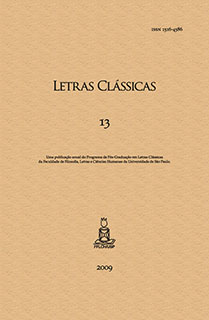Erasmo, barbari, indocte docti e ciceroniani: os modelos clássicos e o ensinamento cristão
DOI:
https://doi.org/10.11606/issn.2358-3150.v0i13p3-28Palavras-chave:
Renascimento, retórica, Erasmo, antiguidade clássica, cristianismoResumo
O propósito deste trabalho é comentar a importância e a permanência dos autores da Antiguidade clássica na obra de um autor cristão consciente dos problemas dessa convivência, o humanista Erasmo de Rotterdam. Este, sem jamais ter abandonado a defesa dos estudos bíblicos, defendeu, por outro lado, a aquisição de um conhecimento profundo dos autores clássicos. No contexto da literatura cristã, em que palavras idealmente rudes devem ser capazes de expressar verdades sublimes, essa questão forma o pano de fundo para discussões sobre o papel da eloquência numa época em que as polêmicas religiosas lançam novas suspeitas sobre a ars, ao mesmo tempo em que a obriga a novas práticas. Esse tema perpassou toda a obra de Erasmo e foi o centro de várias das polêmicas em que se envolveu, tanto contra os barbari, que são aqueles que abrem mão da leitura das obras da antiguidade clássica, quanto contra os ciceroniani, que são aqueles que desprezam os temas cristãos para dedicar-se à literatura pagã.Downloads
Os dados de download ainda não estão disponíveis.
Downloads
Publicado
2009-12-19
Edição
Seção
Artigos
Licença
Autores que publicam nesta revista concordam com os seguintes termos:
- Autores mantém os direitos autorais e concedem à revista o direito de primeira publicação, com o trabalho licenciado simultaneamente sob uma Licença Creative Commons Attribution 2 anos após a publicação, permitindo o compartilhamento do trabalho com reconhecimento da autoria do trabalho e publicação inicial nesta revista.
- Autores têm autorização para assumir contratos adicionais separadamente, para distribuição não-exclusiva da versão do trabalho publicada nesta revista (ex.: publicar em repositório institucional ou como capítulo de livro), com reconhecimento de autoria e publicação inicial nesta revista.
- Autores têm permissão e são estimulados a publicar e distribuir seu trabalho online (ex.: em repositórios institucionais ou na sua página pessoal) a qualquer ponto antes ou durante o processo editorial, já que isso pode gerar alterações produtivas, bem como aumentar o impacto e a citação do trabalho publicado (Veja O Efeito do Acesso Livre).
Como Citar
Sartorelli, E. C., & Leme, F. G. (2009). Erasmo, barbari, indocte docti e ciceroniani: os modelos clássicos e o ensinamento cristão. Letras Clássicas, 13, 3-28. https://doi.org/10.11606/issn.2358-3150.v0i13p3-28


